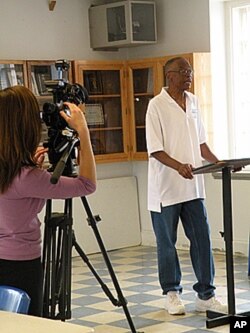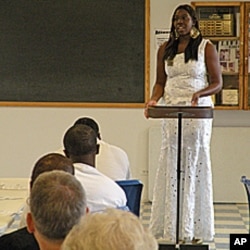If you ask young prisoners what got them behind bars, many will point to negative role models and peer pressure.
To raise awareness among teens and help them steer clear of bad choices, the Maryland Correctional Institution in Hagerstown (MCI-H) runs the Prisoners Against Teen Tragedy (PATT) program.
PATT sponsors an annual essay contest for a $500 scholarship and arranges prison tours for young people.
Essay winner
Tomi Dare, a 17-year-old student at Hagerstown Community College in Maryland, came across a contest announcement a few months ago while browsing through the college website.
"I said, 'Oh, I want that,'" she recalls. "So I looked into it. All what you do is write an essay. And it was about peer pressure and why you feel you don't do drugs."
In her essay, Dare focused on her own experience as an African-American girl growing up with an interest in sports, especially basketball.
"Drugs and alcohol not only slow a person down, it doesn't make you feel you are a winner," she says."It doesn't make you feel you are the best. As an athlete, I'm 6-2 [6 feet, 2 inches tall], so I feel that I should be above peer pressure because I'm bigger than anybody around. So I was talking about that. I was also talking about how I consider myself a queen. And if I am a royalty, I need to not put substances in my body. Drugs and alcohol are not what a queen should be taking."
Sal Mauriello, a case specialist at MCI-H, was one of the judges on the committee that chose Dare's essay as this year's winning entry.
"Just reading her essay, you can tell she was speaking from her heart," he says. "We discussed each essay and we chose this one because it seemed like she really meant what she was talking about."
Prison tours
PATT began in 1988 and it gives young people a chance to learn valuable life lessons from inmates at the facility. At the end of each prison tour, the teens sit down for an open discussion with some of the inmates. < /p>
"We have a group of 11 inmates who are in the PATT program," he says."They tell the youth what they went through as a child, what their crimes consist of. They teach them about peer pressure and bad choices."
Sharing personal accounts like those can save lives, says Mark Vernarelli, MCI-H spokesman.
"These inmates in the PATT program are just heartwarmingly sincere," he says. "They pour out their heart and soul into these young people."
What most teens understand after these sessions, he says, is that a small mistake in judgment, one bad decision, can have big consequences.
"A lot of men and women serving life in prison in the State of Maryland didn't pull a trigger or plunge a knife into anybody," he explains. "They were accessories to a crime. They drove a getaway car. They were with the perpetrator who did the main part of the crime. Yet, they got the life sentence as well. A lot of these young people don't realize there are a lot of people in prison serving life who didn't kill anybody. It's a very eye opening experience to hear these inmates."
Life lessons
PATT is one of Maryland's oldest programs designed to keep young people from a life of crime, but it's not the only one.
"We found that girls really need special sit down sessions sometimes more than boys, so we have a program for girls only," he says. "We have a program that travels across the state. That's called 'Choices,' which is a very graphic program that talks about the dangers of gang affiliation. We have an excellent program called 'Impact' where the inmates actually lead a tour and they have children eat a meal in prison cafeteria with the inmates and do all kinds of activities that are - I don't want to say shocking - but eye opening for the kids."
Vernarelli believes the inmates who participate in the Prisoners Against Teen Tragedy program also benefit. By keeping young people from following in their footsteps, as well as sponsoring an annual scholarship, he says they can feel proud that they are paying society back for the crimes they committed.






